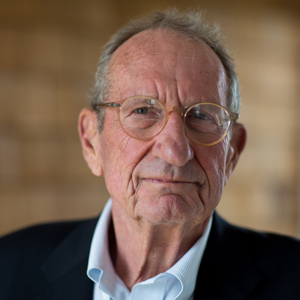Biography
Photo: Full-size (2.5 MB) | 1080 px | 720 px
Copyright © 2015 David Hume Kennerly/Getty Images
John M. Deutch
John Deutch is an emeritus Institute Professor at the Massachusetts Institute of Technology. Mr. Deutch has been a member of the MIT faculty since 1970, and has served as Chairman of the Department of Chemistry, Dean of Science and Provost. Mr. Deutch has published over 140 technical publications in physical chemistry, as well as numerous publications on technology, energy, international security, and public policy issues.
John Deutch has served in significant government and academic posts throughout his career. In May 1995, he was sworn in as Director of Central Intelligence following a unanimous vote in the Senate, and served as DCI until December 1996. In this position, he was head of the Intelligence Community (all foreign intelligence agencies of the United States) and directed the Central Intelligence Agency. From March 1994 to May 1995, he served as the Deputy Secretary of Defense. From March 1993 to March 1994, Dr. Deutch served as Under Secretary of Defense for Acquisitions and Technology.
From 1977 to 1980, John Deutch served in a number of positions for the U.S. Department of Energy: as Director of Energy Research, Acting Assistant Secretary for Energy Technology, and Undersecretary of the Department.
In addition John Deutch has served on many commissions during several presidential administrations. He has served on the President’s Nuclear Safety Oversight Committee (1980–81); the President’s Commission on Strategic Forces (1983); the White House Science Council (1985–89); the President’s Committee of Advisors on Science and Technology (1997–2001), the President’s Intelligence Advisory Board (1990–93); the President’ Commission on Aviation Safety and Security (1996); the Commission on Reducing and Protecting Government Secrecy (1996); and as Chairman of the Commission to Assess the Organization of the Federal Government to Combat the Proliferation of Weapons of Mass Destruction (1998–99).
John Deutch has received fellowships and honors from the American Academy of Arts and Sciences (1978) and Alfred P. Sloan Foundation (Research Fellow 1967–69), and John Simon Guggenheim Foundation (Memorial Fellow 1974–1975). Public Service Medals have been awarded him from the Department of Energy (1980), the Department of State (1980), the Department of Defense (1994 and 1995), the Department of the Army (1995), the Department of the Navy (1995), the Department of the Air Force (1995), the Coast Guard (1995), the Central Intelligence Distinguished Intelligence Medal (1996) and the Intelligence Community Distinguished Intelligence Medal (1996). He received the Greater Boston Federal Executive Board’s Speaker Thomas P. O’Neill Award for exemplary public service in 2002, the Aspen Strategy Group Leadership Award in 2004, and he was elected to the American Philosophical Society in 2007. He delivered the 2010 Godkin Lectures on the Essentials of Free Government and the Duties of the Citizen. He was a member of the National Petroleum Council (2008–2018) and chair of the Secretary of Energy Advisory Board (2012–2017).
John Deutch earned a B.A. in history and economics from Amherst College, and both the B.S. in chemical engineering and Ph.D. in physical chemistry from M.I.T. He holds honorary degrees from Amherst College, University of Lowell, and Northeastern University. He has served as director for the following publicly held companies: American Natural Resources, Citigroup, CMS Energy, Cummins Engine, Perkin-Elmer, Raytheon, SAIC, Schlumberger and Cheniere Energy. He is a trustee of Center of American Progress, Resources for the Future, the Massachusetts General Hospital Physician Organization, the Museum of Fine Arts, Boston, and the Skolkovo Institute. He has served on the board of the Urban Institute and the Council on Foreign Relations. –– Oct 2018
MIT 150 - Infinite History Project: Interview with John Deutch
In this 2016 interview for the MIT 150 celebration and the Infinite History Project archive, Professor Deutch describes his early interests and current views to tell his story as a member of an MIT community that continues to look outward. [Length: 1 hour 30 minutes]
Highlights of this interview include:
- Early graduate work with Irving Oppenheimer.
- Work in polymer solutions, fluid interfaces and liquid crystal solvents, and energy technology.
- Involvement in the MIT Energy Initiative.
- Decision to eliminate the Department of Applied Biological Sciences.
- Perceptions of MIT culture over 40 years.
Choose how to view this video at MIT's Infinite History Project page using the interactive transcript feature. | Explore more footage from the MIT vault at the Infinite History Project.
